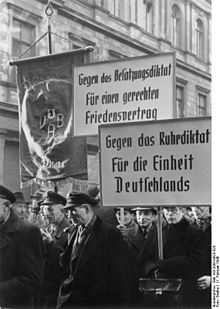31:
167:
substantially increased the internal authority of the
Federal Republic. Skillfully exploiting the Western fears of a communist assault on Europe, which had been awakened by the Korean War, Adenauer gained further concessions from the Western occupying powers in return for his agreement to rearm West Germany within the context of a western European defense system. In 1955 West Germany became a full member of the North Atlantic Treaty Organization (NATO) and gained sovereignty over its foreign relations as the Occupation Statute expired.
166:
succeeded in gaining membership for West
Germany in the European Coal and Steel Community, which later served as the core of the European Economic Community, the precursor of the European Union. In that same year the Americans, British, and French agreed to a revision of the Occupation Statute that
148:(constitution) could only be amended with the unanimous consent of the Allies, and the Allies had the right to veto any legislation that ran counter to the Basic Law or occupation policies. The Allies also had the power to resume full-fledged occupation in the event of an emergency.
141:, foreign trade, the level of industrial production, displaced persons and refugees, protection, prestige and security of the occupying forces, foreign affairs, and foreign trade and exchange. The Federal Republic could only act in these spheres with Allied permission.
48:
96:
219:
145:
121:
organization as an equal partner. The Allies retained the right to keep occupational forces in the country and complete control over
61:) of April 10, 1949 specified the roles and responsibilities of the newly created government of the Federal Republic of Germany (
353:
279:
186:
156:
17:
89:
155:, which was in the process of drafting the Basic Law, to accept the statute. Although it met resistance from the
30:
322:
Miller, Paul D. "A bibliographic essay on the Allied occupation and reconstruction of West
Germany, 1945–1955."
253:
315:
Garner, Curt. "Remaking German democracy in the 1950s: Was the civil service an asset or a liability?."
82:
181:
103:
229:
284:
258:
331:
History of the Allied High
Commission for Germany, Its Establishment, Structure, and Procedures
176:
66:
358:
152:
8:
191:
35:
27:
Treaty defining the relationship between West
Germany and the Allied High Commission
126:
110:
333:(Research Project No. 107 of the Allied High Commission for Germany. 1951) 122pp.
224:
195:
163:
130:
52:
106:
74:
347:
118:
70:
99:
92:
62:
310:
Modern
Germany: An Encyclopedia of History, People, and Culture, 1871-1990
122:
114:
338:
America’s
Germany: John J. McCloy and the Federal Republic of Germany
138:
78:
109:, who deliberated for eight days in intensive conferences in
134:
198:, the first Chancellor of the Federal Republic of Germany.
248:
246:
97:
Secretary of State for
Foreign and Commonwealth Affairs
243:
194:
of
November 1949. Signed between the three Allies and
345:
214:
212:
159:, the council accepted the Occupation Statute.
280:"Formation of the Federal Republic of Germany"
308:Buse, Dieter K. and Doerr, Juergen C., eds.
209:
182:Declaration Regarding the Defeat of Germany
81:representatives and was in force until the
129:, related fields of scientific research,
113:It gave the Federal Republic conditional
29:
14:
346:
151:The Allies' representatives asked the
38:, and against the occupation statute.
220:"THE NATIONS: Agreement on Germany"
24:
302:
187:Allied Occupation Zones in Germany
25:
370:
340:(Harvard University Press, 2013).
312:(2 vol. Garland, 1998) pp 20–21.
90:United States Secretary of State
85:came into force on May 5, 1955.
272:
13:
1:
324:Small Wars & Insurgencies
202:
44:Occupation Statute of Germany
354:Allied occupation of Germany
228:. 1949-04-18. Archived from
7:
170:
88:The statute's authors were
10:
375:
117:and admitted it into the
83:Treaties of Paris (1954)
336:Schwartz, Thomas Alan.
285:Encyclopedia Britannica
259:Encyclopedia Britannica
254:"The era of partition"
177:Allied Control Council
67:Allied High Commission
56:
39:
326:24.4 (2013): 751-759.
153:Parliamentary council
69:. It was drawn up by
33:
162:In 1951, chancellor
192:Petersberg Protocol
319:6.3 (1997): 16-53.
144:Additionally, the
40:
36:The Ruhr Agreement
18:Occupation Statute
329:Plischke. Elmer.
102:, and the French
16:(Redirected from
366:
296:
295:
293:
292:
276:
270:
269:
267:
266:
250:
241:
240:
238:
237:
216:
127:demilitarization
111:Washington, D.C.
58:Besatzungsstatut
51:
34:Protest against
21:
374:
373:
369:
368:
367:
365:
364:
363:
344:
343:
317:German Politics
305:
303:Further reading
300:
299:
290:
288:
278:
277:
273:
264:
262:
252:
251:
244:
235:
233:
218:
217:
210:
205:
196:Konrad Adenauer
173:
164:Konrad Adenauer
131:war reparations
47:
28:
23:
22:
15:
12:
11:
5:
372:
362:
361:
356:
342:
341:
334:
327:
320:
313:
304:
301:
298:
297:
271:
242:
207:
206:
204:
201:
200:
199:
189:
184:
179:
172:
169:
107:Robert Schuman
104:Prime Minister
26:
9:
6:
4:
3:
2:
371:
360:
357:
355:
352:
351:
349:
339:
335:
332:
328:
325:
321:
318:
314:
311:
307:
306:
287:
286:
281:
275:
261:
260:
255:
249:
247:
232:on 2011-01-31
231:
227:
226:
221:
215:
213:
208:
197:
193:
190:
188:
185:
183:
180:
178:
175:
174:
168:
165:
160:
158:
154:
149:
147:
142:
140:
139:cartelization
136:
132:
128:
124:
120:
119:Marshall Plan
116:
112:
108:
105:
101:
98:
94:
91:
86:
84:
80:
76:
72:
68:
64:
60:
59:
54:
50:
45:
37:
32:
19:
359:West Germany
337:
330:
323:
316:
309:
289:. Retrieved
283:
274:
263:. Retrieved
257:
234:. Retrieved
230:the original
223:
161:
150:
143:
100:Ernest Bevin
93:Dean Acheson
87:
63:West Germany
57:
43:
41:
123:disarmament
115:sovereignty
348:Categories
291:2022-12-18
265:2022-12-18
236:2022-12-18
203:References
95:, British
65:) and the
146:Basic Law
49:‹See Tfd›
171:See also
71:American
75:British
133:, the
79:French
77:, and
53:German
225:Time
137:, de
135:Ruhr
42:The
157:SPD
350::
282:.
256:.
245:^
222:.
211:^
125:,
73:,
55::
294:.
268:.
239:.
46:(
20:)
Text is available under the Creative Commons Attribution-ShareAlike License. Additional terms may apply.
